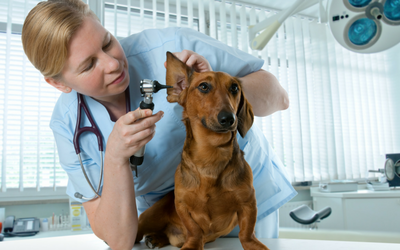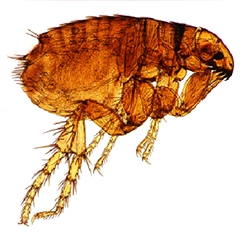what guidelines to follow for 16 week puppies without shots

If you have questions apropos whatever subject related to your puppy's wellness, delight consult with your veterinary.
When should my puppy visit the veterinarian?
Most puppies volition begin going to the veterinarian at two to three weeks of age for an initial health-bank check and de-worming, and and so at six to eight weeks of historic period to begin vaccinations, heartworm, and flea preventive treatments; receive behavior and training advice; and get permanently identified with a microchip. It is important to follow your veterinary's recommended exam schedule to ensure that your puppy receives proper protection and that y'all receive timely and appropriate communication.
When should my puppy exist vaccinated?
In that location are many fatal diseases that can affect dogs. Fortunately, your veterinary has the ability to prevent several of these by vaccinating your puppy. In order to be effective, these vaccines must exist given as a series of timely injections. Ideally, they are given at about 6 to eight, 12, and 16 weeks of age, just the recommended vaccines and schedule of injections may vary depending on your pet's individual needs.
"The core vaccination schedule will protect your puppy from several common diseases..."
The core vaccination schedule will protect your puppy from several common diseases: distemper, hepatitis, parvovirus, and rabies. The first three are generally included in one injection that is given at 6 to 8, 12, and 16 weeks former. Some puppies will receive and additional booster vaccination at 20 weeks of age. Rabies vaccine is given at 12 to 16 weeks of historic period. Other optional vaccinations are appropriate in certain situations. These may include Bordetella, Lyme, and Leptospirosis vaccines if there are risks of those detail diseases based on your geographic location and your family'due south lifestyle. Your veterinarian will help you lot determine which vaccines are recommended for your pet based off of your lifestyle.
Why does my puppy demand more one vaccination? 
When the puppy nurses its mother, it receives a temporary form of immunity through the colostrum, the milk that is produced in the offset days subsequently delivery of the puppies. Colostrum contains high levels of maternal antibodies that can provide passive protection against diseases that the female parent has been exposed to, either naturally or by vaccination. This passive immunity is of benefit during the starting time few weeks of the puppy's life, just at some signal, its levels decline and the puppy must be able to develop its own active long-lasting immunity. Vaccinations are used to provide this long-lasting protection.
Equally long equally the female parent's antibodies are nowadays, vaccinations are unable to stimulate the puppy'south immune system because the mother'southward antibodies neutralize the vaccine.
Many factors make up one's mind when the puppy volition be able to answer to vaccinations. These include the level of immunity in the mother at the time of birth, how many antibodies the nursing puppy absorbed, and the general health of the puppy. Since it is unknown when an individual puppy will lose its short-term maternal immunity, a serial of vaccinations are given. The goal is for at to the lowest degree two of these to autumn into the time frame when the puppy has lost amnesty from its female parent but has not still been exposed to disease. A unmarried vaccination, even if effective, is not likely to stimulate long-term immunity, which is critically important.
Rabies vaccine is an exception to this, since one injection given at the proper fourth dimension is plenty to produce long-term amnesty due to the lack of maternal antibody interference.
How can I provide permanent identification for my dog?
The most widely recommend pet identification device is the microchip. This tiny device is implanted with a needle much like administering an injection. A special scanner tin can observe these chips; veterinarian hospitals, humane societies, and beast shelters across the country have these scanners. A national registry assists in the identification and return of microchipped pets throughout the United States and Canada.
The microchip can exist chop-chop and painlessly implanted during any regular veterinary appointment. Ideally, you should have your puppy identified with this permanent form of identification at its first puppy visit.
Do all puppies have worms?
Intestinal parasites are very common in puppies. Puppies tin become infected with some types of abdominal worms before they are built-in or later through their female parent'due south milk. Microscopic examination of a stool sample volition commonly help your veterinarian to make up one's mind the presence of about abdominal parasites. This exam is recommended for all puppies, peculiarly during their outset few veterinary visits.
"The routine employ of a deworming medication that is prophylactic and effective against several of the common worms is recommended..."
Even if a stool sample is not obtained, the routine utilize of use of a deworming medication that is safe and effective against several of the common worms of the dog is recommended. This protocol is followed considering 1) deworming medication has little, if any, side effects and 2) your puppy does not pass worm eggs every day so the stool sample may not detect worms that are nowadays, just not shedding eggs. Additionally, some of these intestinal parasites can be transmitted to humans. Information technology is important that the deworming is repeated considering it only kills the adult worms.
"Inside three to four weeks, the larval stages of the abdominal parasites will become adults and demand to be removed."
Within three to 4 weeks, the larval stages of the intestinal parasites will become adults and need to be removed. Dogs remain susceptible to re-infection with hookworms, whipworms, and roundworms throughout their life. Periodic deworming throughout the domestic dog'south life may be recommended for dogs that spend time outdoors.
Tapeworms are some other mutual intestinal parasite. Tapeworms crave an intermediate host, pregnant that tapeworms are non passed from dog to dog. Depending on the type of tapeworm, puppies go infected with them when they eat fleas or when they swallow contaminated raw meat or infected mice, birds, or rabbits.
Dogs infected with tapeworms volition intermittently laissez passer pocket-size segments of the worms in their stool. The segments are white in color and expect like grains of rice or cucumber seeds. They are about an eighth of an inch (three mm) long and may be seen crawling on the surface of the stool. They may also stick to the hair under the tail. If that occurs, they volition dry, shrink to about half their size, and become aureate or light brown in colour. If you observe tapeworm segments on your dog's stool, delight collect them and bring them into your veterinarian for identification so that the appropriate drug for handling can be prescribed.
What tin can be done about fleas on my puppy?
Opposite to popular belief, the bulk of the flea life cycle is spent off the dog; only the adult lives on the animate being. The egg, larva, and pupa feed and develop in the environment. Therefore, flea control must include handling of the environment, every bit well as the pet. Many of the flea control products that are safe on adult dogs are not safe for puppies less than two to iii months of historic period. Exist sure that whatever flea product you use is labeled safe for puppies. Consult with your veterinarian to determine which flea medication is appropriate for your puppy.
What are heartworms?
Heartworms are important parasites, especially in warm and humid climates where mosquitoes are prevalent. They live in the dog's bloodstream and cause major harm to the heart and lungs and often issue in expiry. Heartworms are transmitted by the bite of mosquitoes. Heartworm preventives are dosed according to your dog's weight. Every bit your dog's weight increases, the dosage should too increment. They are very prophylactic and effective if used as directed. Many of these products also protect your dog against certain intestinal parasites and external parasites such equally fleas.
What are ear mites?
Ear mites are tiny parasites that alive in the ear culvert of dogs and cats. The most mutual sign of ear mite infection is fierce and persistent scratching of the ears. Sometimes the ears volition appear dirty considering of a black material in the ear canal. The tiny mites can be seen with magnification, either directly in the ear with an otoscope, or by examining a sample of the ear discharge under a microscope. Ear mites spend the vast majority of their lives within the protection of the ear culvert and transmission requires direct contact with an infected beast. Ear mites are more common in cats than in dogs.
In dogs, ear infections are the most common cause of a night belch in the ear canals. It is important that your puppy is examined to differentiate between infection and ear mites. It is inappropriate for a veterinarian to dispense medication without an authentic diagnosis. 
Why should I have my female domestic dog spayed?
"Spaying is the surgical removal of the uterus and the ovaries..."
Spaying is the surgical removal of the uterus and the ovaries, and eliminates the dog's heat, or "heat" cycles. In an intact dog, these heat periods result in about 2-3 weeks of vaginal bleeding and discharge approximately every vi months. During this fourth dimension, male dogs are attracted from blocks away and, in fact, seem to announced out of thin air when a female person is in heat!
Male dogs will go over, around, and through doors or fences to reach a female in heat. Apart from the run a risk of unplanned pregnancies, it is well documented that intact female person dogs take a pregnant risk of developing breast cancer and/or uterine infections. Spaying before the canis familiaris experiences her first heat cycle has 3 benefits: it eliminates the risk of unplanned pregnancy and helps control the trouble of dog overpopulation; information technology eliminates any possibility of uterine disease; and it virtually eliminates any chance of developing breast cancer. If you do non plan to brood your dog, information technology is strongly recommended that your puppy is spayed before 6-seven months of age.
Why should I take my male person dog neutered?
Intact male person dogs are attracted to a female dog in estrus and will climb over or become through fences to detect her. Intact male dogs tend to be more territorial towards other male person dogs. Intact male dogs are decumbent to develop prostatic disease as they age and testicular cancer is relatively common in intact male dogs.
"Neutering or castration is the surgical removal of the testicles..."
Neutering or castration is the surgical removal of the testicles, and will forestall or decrease these problems, likewise as being an constructive method of controlling the problem of overpopulation. The surgery tin can be performed whatever time after the dog is six months old.
If I choose to breed my female dog, how erstwhile should she be?
If you plan to brood your dog, she should have at least one or two estrus periods first. She will then be more than physically mature allowing her to be a amend female parent. Breeding afterwards five years of age is not recommended unless she has been bred prior to that. Having her offset litter afterwards five years of age increases the take a chance of complications during the pregnancy or delivery. For more than information, encounter the series of handouts on "Convenance for Dog Owners".
Equally always, if you have whatever concerns or questions nearly your new puppy, contact your veterinarian.
Source: https://vcahospitals.com/know-your-pet/puppy---recommendations-for-new-owners-part-i---veterinary-care

Belum ada Komentar untuk "what guidelines to follow for 16 week puppies without shots"
Posting Komentar